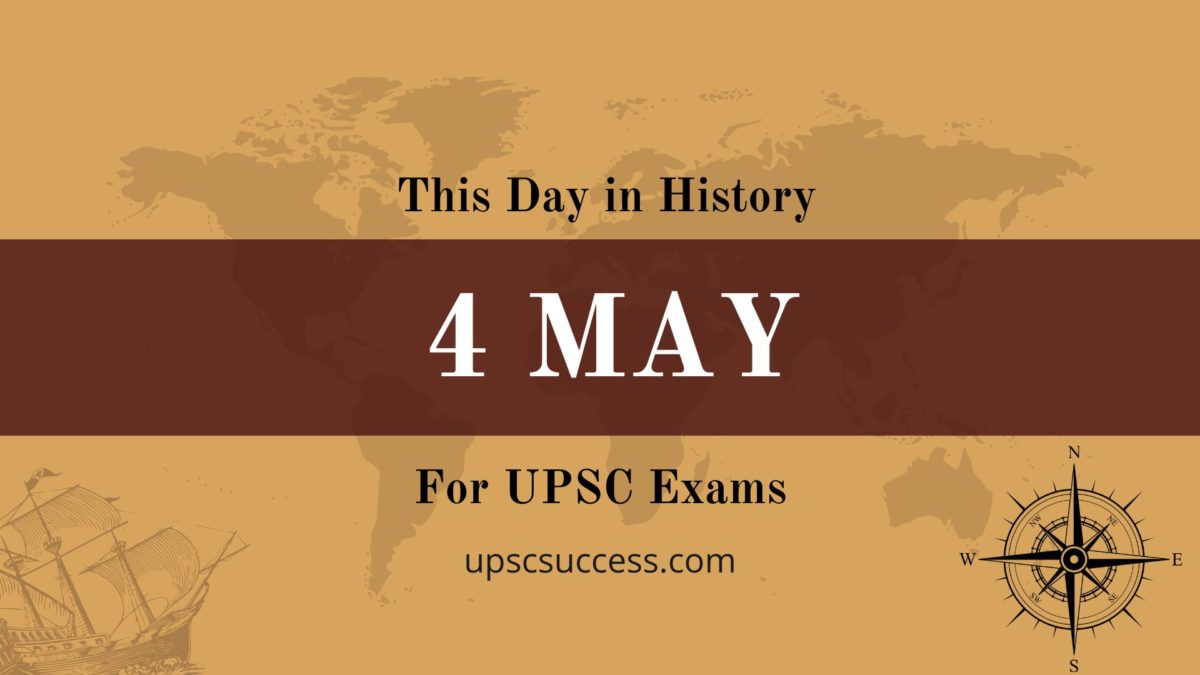Contents
This Day in History on 4th May
The historical events hold a lot of value for aspirants who are sitting for UPSC competitive exams including the IAS Exam.
On this page, we will list all historical events that occurred on the 4th of May. The students can refer to them while preparing for all competitive exams and banking exams.
Important Days
- Youth Day (Fiji)
- Youth Day (China)
- Literary Day (Republic of China)
- Restoration of Independence day (Latvia)
- Remembrance of the Dead (Netherlands)
Important Events
1783: Tipu Sultan was enthroned as the ruler of Mysore after the death of Haider Ali in a simple ceremony at Bednur. He continued the Second Mysore War against the English. He defeated many EnglishGenerals like Brithwhite & Col. Bailey. Tipu Sultan signed the treaty at Mangalore on 11th March 1784 A.D. which was known as the Mangalore treaty.
1799: Tipu Sultan, the ruler of Mysore state, was killed while fighting with the British at Srirangapanam in Karnataka.
1832: Darpan’, a fortnightly magazine started publishing as a weekly.
1854: The first stamp was officially issued from Calcutta where the first modern post office was established.
1932: Many are arrested as Congress agents picket Bombay post offices in celebration of Gandhi Day
1959: Nehru rejects proposals that India and Pakistan resolve their differences and set up a common alliance against Communist China.
1959: The first Grammy Awards were held.
1960: Washington, Ike signs wheat pact with India for largest U.S. food sale.
1979: Margaret Thatcher became the first woman Prime Minister of the United Kingdom.
1980: Coal Mine Worker’s Day was established.
1990: Supreme Court directs Central Government to set up a Tribunal to resolve the Cauvery water dispute between Tamil Nadu and Karnataka.
1992: Musician Bhupen Hazarika was awarded the Dadasaheb Phalke Award.
1992: India and Russia sign a five-year agreement on trade and economic cooperation.
1993: Income Tax exemption limit raised to Rs.30,000; Customs duty on certain drugs reduced.
1993: Santosh Yadav became the first Indian woman to conquer Everest twice.
1994: Fourth developmental launch of ASLV. 113 kg Stretched Rohini Satellite Series (SROSS-C2) was launched by a fourth developmental flight of ASLV-D4 from Sriharikota. This carried two scientific payloads, a Gamma Ray Burst (GRB) experiment and a Retarding Potential Analyser (RPA). It is still in service.
1995: Maharashtra Cabinet decided to rename Bombay Mumbai.
1996: India won six silver medals at the World Weightlifting Championships, while N Kunjurani Devi won two.
1998: India is placed on the US Special 309 watch list.
Birthday / Anniversary
1006: Khwaja Abdullah Ansari, a Persian Sufi saint.
1649: Maharaja Chhatrasal, a medieval Indian warrior from the Bundela Rajput clan.
1655: Bartolomeo Cristofori, an Italian instrument maker and inventor of the piano.
1767: Tyagaraja, a renowned composer of Carnatic music, a form of Indian classical music.
1825: Thomas Huxley, an English biologist, and anthropologist.
1849: Jyotirindranath Tagore, the Bengali litterateur and poet, was born.
1923: Mrinal Sen, a famous film director, was born.
1934: Arun Date, an Indian-Marathi singer of Bhavageete.
1935: Dalip Kaur Tiwana, the great educationist and writer, was born in Ribbon village, Punjab.
Death / Death Anniversary
1799: Tipu Sultan, the ruler of the Kingdom of Mysore based in South India.
1938: Kano Jigoro, a Japanese educator and athlete, the founder of Judo.
1957: Rai Chaudhary Hemchandra, a great historian, passed away.
1980: Anant Kanekar, an Indian-Marathi writer.
1980: Joseph Tito, the first president of Yugoslavia.
1989: Ashutosh Mukhopadhyay, one of the most prominent writers of modern Bengali literature.
2008: Pandit Kishan Maharaj, an Indian tabla player.

